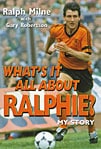 My Story
My Story
by Ralph Milne with Gary Robertson
Black And White, £14.99
Reviewed by Neil Forsyth
From WSC 277 March 2010
In August 1991 Ralph Milne travelled to London and met a Chinese football agent in Green Park. After changing into a tracksuit behind a tree, Milne dribbled past the Chinese a few times before they switched to practising passing. Milne launched the ball with such force it caught the agent flush in the face, sending him into the mud. He got to his feet with the news that Milne had earned a short-term deal to play in Hong Kong. A few months before Green Park Milne had been on Man Utd’s books. A few years before that, he’d been one of the most exciting Scottish players of his generation. But a few years before that, he’d discovered alcohol.
As a Scottish football fan it’s repetitive and depressing to read of careers summarised “outstanding ability but liked a drink”. Milne meets both factors with gusto. Most of his career was spent at his hometown club of Dundee Utd under the notoriously stern management of Jim McLean. Milne thrilled the fans and infuriated McLean. He ran 100m at 10.1 seconds “in old trainers” and his wingplay was a major factor behind Dundee Utd’s domestic and European success in the 1980s. Milne scored 15 European goals and the only opposing midfielder he admits getting the better of him was Falcão during defeat to Roma in the 1984 European Cup semi-final. The season before Milne had scored a remarkable chip in the game that won United the League at the home of city rivals Dundee.
And all the time there was the drinking. “Plastered”, “guttered”, “pissed” – Milne’s main demand on his ghostwriter is synonyms of drunkenness. McLean fines him religiously and Milne and Dundee Utd part in a severing that still attracts bitterness in these pages. Milne went to Charlton and then Bristol City where under Joe Jordan he rediscovered enough form to earn the move that would gain him notoriety in Manchester.
Everything about Milne’s time at Man Utd feels surreal. Alex Ferguson knew Milne as the exceptional talent who tortured his Aberdeen sides five years before but Milne accepts he’d become a player diluted by lifestyle. The result is Milne being heralded by some fans as Ferguson’s greatest folly. What’s forgotten is that Milne, played out of position on the left, started his Old Trafford career relatively well. He scored three goals and Ferguson complimented him on the support he offered the young Lee Sharpe.
Alcohol soon emerged victorious. Milne’s best pals were Norman Whiteside and Paul McGrath. He talks fondly of leading United’s squad to a karaoke bar during an Asian tour and sneaking down to Ascot with Steve Bruce and Bryan Robson. The book ends with quotations that graphically trace Milne’s career. Whiteside remembers a “lovely fellow” and a bar called the Paloma Palace. Milne’s former Dundee Utd team-mates, such as Richard Gough and Dave Narey, speak only of his talent. “Extraordinary”, “incredible”, “breathtaking”.
They salute the man who lit up the Scottish League, the European stage and marked his hometown team’s single League win with one of the most memorable Scottish goals of all time. There should have been more achievement, but this book recalls just how much achievement there was.